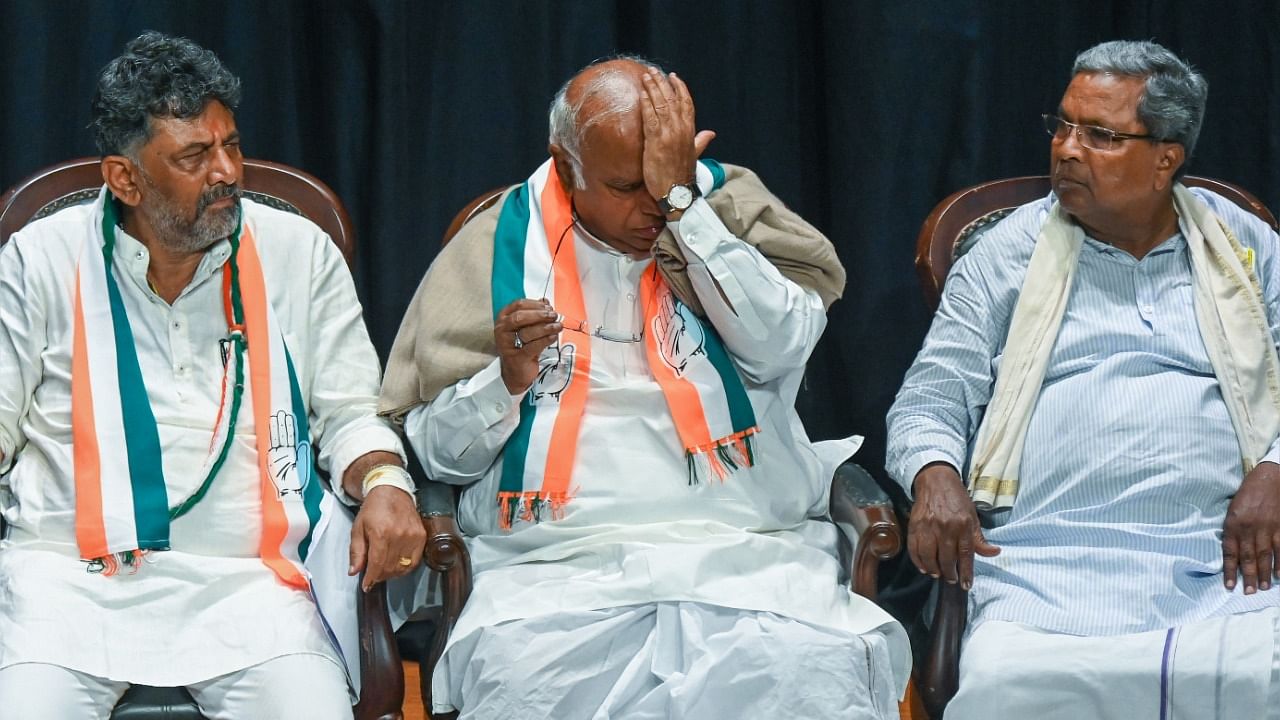
While celebrating the Karnataka Assembly election results on May 13, Congress President Mallikarjun Kharge was euphoric when he said that the people of Karnataka have ensured that South India was BJP-mukt. True. What is also true is before May 13 South India was also Congress-mukt. With the electoral probability of it winning only Kerala in the region, the Congress cannot waste the opportunity the electorate in Karnataka has given it.
Winning 135 of the 224 Assembly seats is no mean feat — however, the impasse in choosing a Chief Minister and forming a government has taken the sheen off that victory.
The problem is not that the Congress took time to decide a chief ministerial candidate — after all, the Bharatiya Janata Party (BJP) took much longer to decide on its chief ministers in Uttar Pradesh and Assam — but, the grand old party was not seen to be in control. The groundswell support and goodwill the party had been enjoying since May 13 has been dwindling because the party leadership does not seem to be in control here.
Also Read | Siddaramaiah vs Shivakumar: Suspense over new Karnataka CM continues despite hectic meetings
Muddying The Waters
That the Congress national leadership convinced former Chief Minister Siddaramaiah or Karnataka Congress President DK Shivakumar to put aside their differences to fight the assembly election together saved the day for the grand old party — but it is now clear that a post-poll agreement/plan was not in place. Was the Congress not expecting to win the polls, or win with such a margin? Either way, it is political myopia.
News reports speculate that Siddaramaiah is likely to become the Chief Minister, while the party leadership is yet to convince Shivakumar to settle for another post.
The impasse is bound to affect the party-government in the long term. More leaders, and groups could come out supporting either of the contenders, thereby further muddying the waters. In the weeks and months ahead if political developments deteriorate, we could be in for resort politics, defections, which could even revive the BJP’s hopes to form the government.
Test For Kharge
It would be unfair to put the onus entirely on Congress President Mallikarjun Kharge. A weak national leadership has been a decades-old problem for the Congress. Unlike the current national leadership of the Bharatiya Janata Party (BJP) where the writ of Prime Minister Narendra Modi and Union Home Minister Amit Shah is unchallenged, the Congress has not had such a leader in recent history.
Kharge deserves praise for the victory in Karnataka — but the impasse has tested his leadership qualities, his organisational wisdom, and will impact his future as Congress chief.
Preparations For 2024
The impasse could weaken the party in the state, and this has a two-fold impact: One, it will be a drag on the party’s performance over the next five years. A live example of sweeping problems under the carpet are the developments in the party in Rajasthan. In a worst-case scenario for the Congress, things could also go the way it went for the Kamal Nath government in Madhya Pradesh.
Two, a weak/divided Congress will fare poorly in the 2024 Lok Sabha polls. In the 2019 Lok Sabha polls, the BJP-led National Democratic Alliance (NDA) won 26 of the 28 seats from Karnataka. If the Congress were to maintain the current momentum in its favour, the BJP would have to sweat it out to win even half of what it won in 2019. This would help the Congress’ case at the national level among opposition parties.
The Congress has won the battle on May 13, it must not lose the war because of a leadership tussle.
Disclaimer: The views expressed above are the author's own. They do not necessarily reflect the views of DH.